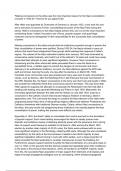"Making concessions to the elites was the most important reason for the Nazi consolidation
of power in 1933-34." How far do you agree? [30]
After Hitler was appointed as Chancellor of Germany in January 1933, it only took him one
and a half years to become Fuhrer, consolidating the power of the Nazi Party during this
period. Hitler's concessions to the elites helped achieve this, but it is not the most important
contributing factor. Indeed, the party's use of force, popular support, and quasi-legal
measures cannot be disregarded in their responsibility for the successful Nazi consolidation
of power.
Making concessions to the elites ensured that the institutions powerful enough to prevent the
Nazi consolidation of power were pacified. During 1933-34, the Nazis refused to carry out
actions that would have antagonised these groups whilst seeking their approval of Hitler's
regime. The cabinet of the Nazi-nationalist coalition from January 1933 was dominated by
conservative vested interests, who held 9 out of the cabinet's 12 seats and could have easily
obstructed Nazi attempts to pass significant legislation. However, Nazi concessions to
Hindenburg and the other aristocratic elites persuaded them to view the Nazis as a
sympathetic force, a reliable agent to prevent the dangers of communism and return
Germany to its authoritarian traditions. As such, the Nazi offensive against the KPD was
swift and clinical, banning the party one day after the elections on March 6th, 1933.
Hundreds more communists were also arrested and many were sent to early concentration
camps, such as Dachau, after the Reichstag Fire in late February that year was blamed on
the KPD. Besides this, the Nazis' concessions to the Army won their trust and loyalty in Hitler
and avoided the militaristic threat they would have posed to the Nazis. This was done after
Hitler agreed to suppress SA attempts to incorporate the Reichswehr into their fold after a
meeting with leading army generals Blomberg and Fritsch in April 1934. Meanwhile, the
Concordat agreement between the state and the Vatican on July 20th 1933, acted as a
concession to the Catholic Church that ensured religious freedom in Germany, albeit in
appearance only. This convinced the clergy to condone the Nazi takeover of the state while
progressing toward Nazi aims of relinquishing religious differences between Protestants and
Catholics intertwined with traditional German society. Clearly, without Nazi concessions to
the elites, the party would risk antagonising those institutions into reacting against the Nazi
consolidation of power, making this process more difficult and violent.
Especially in 1933, the Nazis* ability to consolidate their control was built on the foundation
of popular support. Such mass backing encouraged the Nazis to rapidly pursue more
dramatic and ambitious means of obtaining absolute power with the assurance that a strong
base of support would always be available to fall back to. After winning the March 1933
election by another clear majority of 43.9% votes, the Nazis were endowed with an even
more significant majority in the Reichstag, obtaining 288 seats. Although this was considered
unsatisfactory by the party at the time because it needed a two-thirds majority to pass
significant legislation without having to work with other parties, such a large proportion of
seats prompted the Nazi leadership to consider manoeuvres to pass the Enabling Act.
Furthermore, popular support seemed to justify the Nazi proclamation of a one-party state on
July 14, 1933, on the grounds that the German people had repeatedly given their confidence
to the party in the previous three elections, which all resulted in an NSDAP majority. Aside
from this, the successful Nazi acquisition of mass support from Germans of all classes and
regions through propaganda strategies such as canvassing, which directed propaganda




